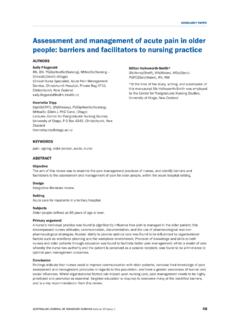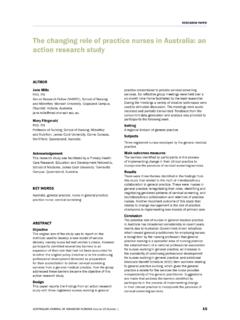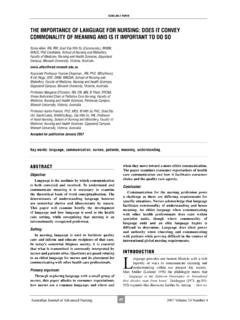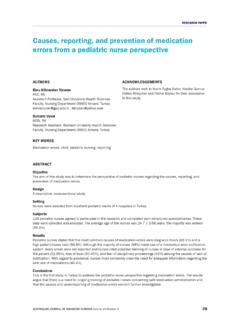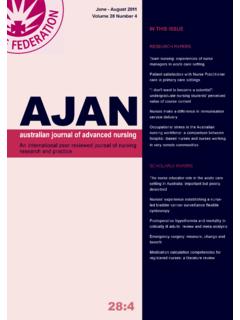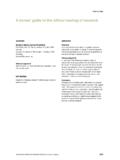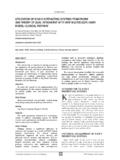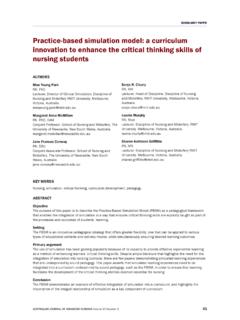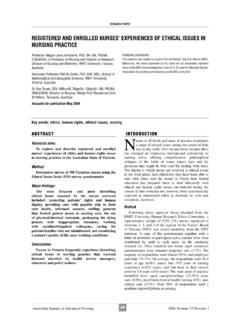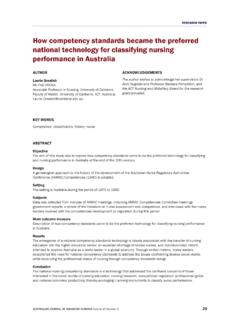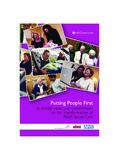Transcription of A culture change in aged care: The Eden AlternativeTM
1 AUSTRALIAN JOURNAL OF ADVANCED NURSING Volume 29 Number 163 SCHOLARLY PAPERA culture change in aged care : The Eden AlternativeTM AUTHORDr. Sonya Brownie PhD, GradDipSc Lecturer, Ageing, aged care & aged Services, School of Health and Human Sciences, Southern Cross University, Lismore, New South Wales, Australia. KEY WORDSThe Eden AlternativeTM , ageing, aged care , culture changeABSTRACT ObjectiveThe purpose of this article is to provide an overview of the values that The Eden AlternativeTM represents. The benefits, challenges and potential risks, associated with implementing this model for culture change will also be discussed. Setting Currently, 36 residential aged care facilities in Australia and New Zealand have implemented The Eden AlternativeTM . Alzheimer s Australia has recently adopted The Eden AlternativeTM in two Western Australia respite centres to advance care practices.
2 Primary argumentThe Eden AlternativeTM is a model for culture change in aged care that aims to enrich the lives of all who live and work in residential aged care facilities. Children, animals and plants enliven the environment and create an atmosphere reminiscent of home. The Eden AlternativeTM promotes human growth in aged care environments and strives to empower and enable older people to fulfil their right to construct and pursue meaningful lives. Conclusions In the United States of America (USA), The Eden AlternativeTM is associated with numerous benefits, including reductions in the total number and type of medications used by residents, ( a decline in mind and mood altering drugs); reduced infection rates among residents; improved levels of sociability among residents; reduced levels of boredom and feelings of helplessness among residents, and improved staff retention rates.
3 However, these findings need to be interpreted cautiously due to lack of information about, and limitations in, study designs. Further research is needed in Australia to establish the impact of this model for culture change on residents and nurses who live and work in these JOURNAL OF ADVANCED NURSING Volume 29 Number 164 SCHOLARLY PAPERINTRODUCTION Residential aged care services are an integral component of the accommodation and support systems available for frail elderly or disabled older people who are unable to live independently at home. As of June 2009 there were 2,783 residential aged care facilities (RACFs), providing a total of 211,345 places, offering low or high level care , and short term respite care services (DoHA 2009). While only a small proportion (6%) of older persons reside in RACFs at a given point of time, the lifetime probability of a person entering a RACF is high: a person aged 70 has a 37% chance of needing high level aged care during his/her life (Rowland et al 2002).
4 On average permanent residents spend about 148 weeks in RACFs (AIHW 2009). By 2008 people aged 65 years and over constituted 13% of the population, representing a total of million Australians (ABS 2009). In 2016 this figure is expected to increase to 16% of the population when the majority of the post war baby boom generation reaches retirement. It is estimated that by the year 2042 almost one quarter ( ) of the total population will be aged 65 years and over, by which time the requirement for aged care places is expected to have risen three fold (Australian Government Productivity Commission 2008). Population ageing has significant implications for the provision of aged care services; not least is the capacity of the workforce of aged care nurses to respond to the care needs of the projected number of older Australians.
5 Registered nurses have been leaving the aged care sector in large numbers, citing job dissatisfaction, stressful work conditions, and an unsupportive workplace as reasons for leaving the sector (Moyle et al. 2003; Pearson and Nay 2002). Managers of RACFs consistently report problems with attracting and retaining younger nursing graduates (DEST 2002).The aged care sector is also under pressure to provide a range of innovative and contemporary models of aged care that preserve an individual s sense of personal autonomy and decision making. Older people (particularly baby boomers) have expressed a strong preference for alternative forms of aged care and accommodation, and a greater ability to exercise control over where they live and the nature and quality of services they will receive (Benevolent Society 2008; McCallum 2000).
6 According to Kendig and Duckett (2001, p. 67) ensuring consumer responsiveness and satisfaction is going to be an increasingly important component of the next generation of aged care policy . Perhaps the greatest challenge facing the aged care sector is its capacity to ensure the right of all older people in RACFs to a fulfilling, purposeful life. The United Nations Principles for Older Persons (UN 2007) acknowledges that older persons should be able to pursue opportunities for the full development of their potential . aged care facilities focused on resident directed care and improvement in quality of life of residents foster opportunities for older people to live up to their highest potential. BACKGROUND TO THE EDEN ALTERNATIVETMRACFs have traditionally been viewed as places of long term treatment and therapy dominated by the medical model that values efficiency, consistency and hierarchy of decision making (Rosher and Robinson 2005).
7 Since the 1990s some RACFs have abandoned this medical approach to aged care and replaced it with a more humanistic model. The movement away from an institutional model of aged care to one that accepts resident directed care as the guiding or defining standard of practice is part of a culture change that is positively impacting the provision of aged care services in Australia and around the world. The Eden AlternativeTM is one example of a culture change model that aims to promote autonomy and self determination, and emotional and social wellbeing, as attainable goals for aged care residents. The Eden AlternativeTM is affiliated with the USA Eden Alternative through licensing arrangements, and indirectly to other similar organisations established throughout the world. (When The Eden AlternativeTM is used in this article it refers to the model for culture change outlined in the ten principles.)
8 AUSTRALIAN JOURNAL OF ADVANCED NURSING Volume 29 Number 165 SCHOLARLY PAPERDr William Thomas, the USA geriatrician who founded The Eden AlternativeTM in 1991 aspired to create a human habitat to eliminate loneliness, helplessness and boredom from the lives of residents in aged care facilities, which he argued were the plagues of ageing that account for the bulk of their suffering. He believed that every creature has a habitat in which it thrives, and one in which it withers. Human beings wither in institutions (Thomas and Johansson 2003, ). Dr Thomas wanted to transform long term care and enliven the environment with children, animals and plants to create an atmosphere reminiscent of home. He developed an approach, based on ten principles (table 1) to enhance the quality of life aged care residents by incorporating companionship, a sense of purpose, variety and spontaneity into their day to day Eden AlternativeTM is a not for profit organisation based on a philosophy of developmental ageing that recognises late life as an active phase in the ageing trajectory, in which individuals should have access to, and opportunities for, ongoing learning and personal growth and development (Thomas and Johansson 2003).
9 This approach aims to create an environment in which older people are given opportunities to construct and pursue meaningful lives. The Eden AlternativeTM acknowledges the right of older people to a life worth living (Thomas 1996). EDEN IN THE USA AND INTERNATIONALLY The Eden AlternativeTM has become well established in the USA, and since its inception almost 20 years ago at least 200 American aged care facilities have adopted The Eden AlternativeTM . The Eden AlternativeTM has also spread globally, with Eden Alternative facilities in the United Kingdom and Ireland; European countries, including Germany, Austria and Switzerland; Scandinavian countries, including Sweden, Denmark, Finland, and Norway; Japan, and other countries. EDEN IN AUSTRALIA AND NEW ZEALAND There are 36 RACFs (comprising religious, charitable and community based not for profit groups and for profit organisations) across Australia and New Zealand actively engaged in implementing The Eden AlternativeTM .
10 Recently Alzheimer s Australia implemented The Eden AlternativeTM in two Western Australia respite facilities to improve the quality of life of people with dementia and their carers (Alzheimer s Australia 2004). BENEFITS ASSOCIATED WITH THE EDEN AlternativeTM Robust, independent evaluation of this philosophy and model for culture change has not been a priority of Eden Alternative facilities. The purported benefits associated with The Eden AlternativeTM have in general, been informed by data gleaned from residents records, quality indicators, staff observations and staff reports. Studies using this approach to data collection have shown that The Eden AlternativeTM is associated with numerous benefits, including reductions in the total number and type of medications used by residents, ( a decline in mind and mood altering drugs); reduced infection rates among residents; improved levels of Table 1: The ten Eden Alternative principlesLoneliness, helplessness and boredom are 1.
